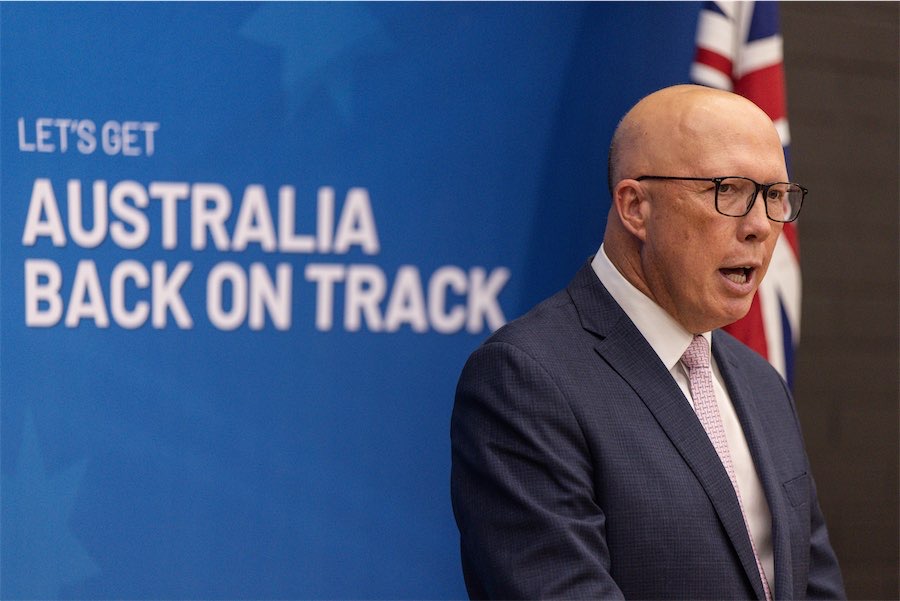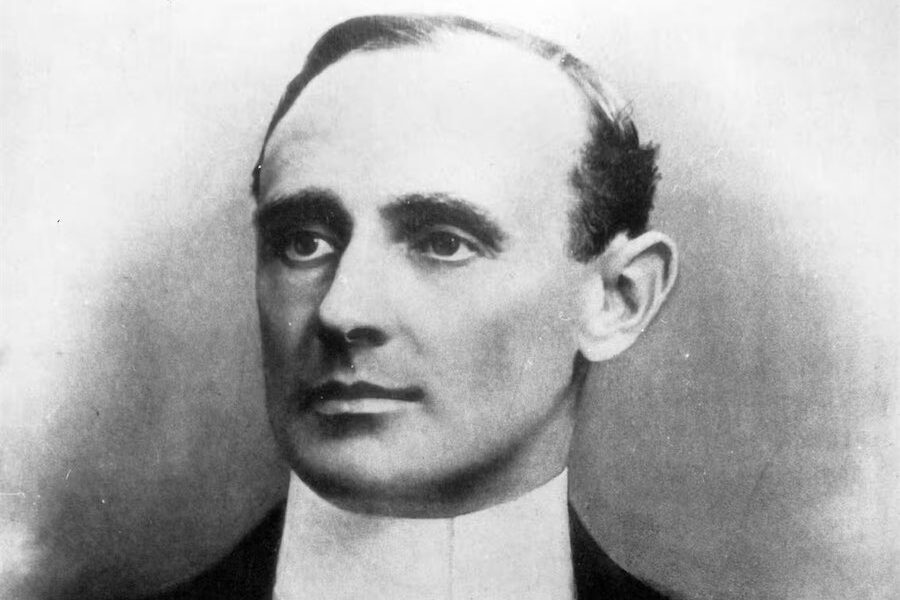For Scott Morrison, putting up the religious discrimination bill is fulfilling an election promise, but he would also see it as a much needed wedge against Labor, writes political columnist MICHELLE GRATTAN.
SINCE he returned from overseas, Scott Morrison has been where he’s most comfortable – on the campaign trail, in high-vis gear where possible.

Making up for time lost to lockdown and quarantine, last week the prime minister took in some ten seats in NSW and Victoria, including Labor seats being targeted and Liberal electorates being defended. This week he was out and about in NSW. He can’t get into Western Australia and Queensland, both crucial for the Coalition.
Morrison dropped various bits and pieces of policy along the way, and road-tested scares against Labor, conjuring up the spectre of higher petrol prices, interest rates and electricity charges.
Whether he can make anti-Labor “scares” believable remains to be seen. Labor’s small-target strategy and Morrison’s own credibility issues raise the bar for him. Newspoll this week brought some bad news in what has become the public debate about the PM’s character.
His ratings on various attributes have taken big tumbles since April. On trustworthiness, he fell from 57 per cent to 42 per cent, losing his lead over Anthony Albanese, who scored 44 per cent.
After his revitalising time on the hustings, Morrison is about to enter a special sort of “lockdown”. Parliament is returning for its last two weeks of the year and it’s likely to be a pressure cooker.
Two key pieces of legislation have been in the frame for this fortnight: the religious discrimination bill and a bill for the long-awaited integrity commission, both under Attorney-General Michaelia Cash.
The government is giving priority to the religious discrimination legislation, an odd choice when integrity is resonating strongly with many voters. And it is now leaving open the timing of the integrity bill.
Action on religious discrimination has its genesis in Malcolm Turnbull’s gesture to the conservatives who lost in the marriage equality vote. It has dogged the government ever since, with earlier iterations of the legislation unacceptable to various stakeholders.
In the latter days of Christian Porter’s attorney-generalship the bill appeared likely dead. There’s no obvious need for it, and conservative and small-l liberal critics have been worried, for different reasons, about unintended consequences.
But Morrison has revived the push, backbenchers have been briefed and a bill is set to go to the joint parties meeting next week.
The legislation, yet to be released, has been considerably watered down.
After the sacking of rugby player Israel Folau for his Bible-based attack on homosexuals, adulterers, drunks, liars and others, the earlier version would have curbed the rights of big businesses to take such action. This has now been dropped. As has a provision that would have allowed medicos to refuse to provide services on the grounds of their religion.
The bill will preserve and reinforce the right of religious schools when hiring to prefer staff who accord with their religious beliefs and principles.
For Morrison, putting up this legislation is fulfilling an election promise. But he would also see it as a possible wedge against Labor.
While for many voters this issue would be neither here nor there, it could be a different story in western Sydney, with its ethnic communities.
Labor’s Chris Bowen, who holds the western Sydney seat of McMahon, warned his party after the last election “how often it has been raised with me that people of faith no longer feel that progressive politics cares about them”.
Labor is also under pressure from the National Catholic Education Commission, whose executive director is former ALP senator Jacinta Collins.
Collins would like to see the federal bill through on a bipartisan basis before Christmas. The commission wants the federal legislation (which would override state laws) in place quickly because of its concern about proposed changes to the Victorian equal opportunity law, which it says “could curb the ability of Catholic schools to act in accordance with their ethos”.
Federal Education Minister Alan Tudge, also referencing the Victorian move, says the aim is to get the bill through this year.
Labor isn’t committing itself on the bill without seeing it, but Albanese will be extremely anxious to avoid a wedge.
For its part, the government’s challenge is to avoid wedging itself. Both moderates and conservatives in its own ranks have had gripes with the legislation and have to be reassured.
The government had consistently said it intended to introduce the integrity commission bill before Christmas, until a red flag went up when Cash dodged at Senate estimates last month. Asked by Labor, “are we going to see the legislation this year?”, Cash said, “that will be a decision for the cabinet”.
On Thursday Deputy Prime Minister Barnaby Joyce and Employment Minister Stuart Robert left the timing in doubt in interviews on Sky. If the introduction is delayed the government will hand ammunition to the opposition and other critics.
Whenever it comes, the legislation will be under fire from many who will argue that, despite whatever changes the government has made to its original model, it doesn’t go far enough. Its fate would be problematic.
One bill, already in parliament, that the government will pull out all stops to have dealt with before Christmas would require people to produce ID when voting. Although the Christmas timetable isn’t vital if the election is not until May, the government won’t want to take chances. Anyway, the Australian Electoral Commission would presumably want plenty of leeway to sort out the practicalities of such a change.
This bill is highly contentious, with Labor arguing it would discourage voting by vulnerable people – including some in Indigenous communities and the homeless.
Labor will oppose the bill, which would therefore need crossbench support to get through. The situation is further complicated by a couple of rebel Coalition senators, Gerard Rennick and Alex Antic, who are threatening to withhold their vote on government legislation because of a dispute over vaccine mandates, and Pauline Hanson’s threat to cause disruption over the same issue.
For the Morrison government, parliament is more often to be endured than enjoyed. Parliament usually plays better for the opposition. The PM will be relieved when he can get out of the place and back into his high-vis uniform.
Michelle Grattan is a Professorial Fellow at the University of Canberra. This article was originally published on The Conversation.
Who can be trusted?
In a world of spin and confusion, there’s never been a more important time to support independent journalism in Canberra.
If you trust our work online and want to enforce the power of independent voices, I invite you to make a small contribution.
Every dollar of support is invested back into our journalism to help keep citynews.com.au strong and free.
Thank you,
Ian Meikle, editor




Leave a Reply